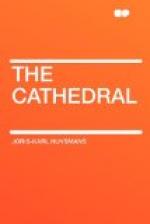This arm of the river diverted into the moat of the old ramparts, encircled Chartres, bordered on one side by the trees of the alleys, and on the other by cottages with terraced gardens down to the level of the stream, the two banks joined by foot-bridges of planks or cast iron arches.
Near where the Porte Guillaume uplifted its crenelated towers like raised pies, there were houses that looked as if they had been gutted, displaying, as in the vanished cagnards or vaults of the Hotel Dieu at Paris, cellars open on the level of the water, paved basements in whose depths of prison twilight stone steps could be seen; and on going out through the Porte Guillaume across a little humpbacked bridge, under the archway still showing the groove in which the portcullis had worked which was let down of yore to defend this side of the town, he came upon yet another arm of the river washing the feet of more houses, playing at hide and seek in the courts, musing between walls; and at once he was haunted by the recollection of another river just like this, with its decoction of walnut hulls frothed with bubbles; and to contribute to the suggestion, the more clearly to evoke a vision of the dismal Bievre, the rank, acrid, pungent smell of tan, steeped, as it were, in vinegar, came up in fumes from this broth of medlar juice brought down by the Eure.
The Bievre, a prisoner now in the sewers of Paris, seemed to have escaped from its dungeon and to have taken refuge at Chartres that it might live in the light of day; winding by the Rues de la Foulerie, de la Tannerie, du Massacre, the quarters invaded by the leather-dressers, the skinners and tan-peat makers.
But the Parisian environment, so pathetic in its aspect of silent suffering, was absent from this town; these streets suggested merely a declining hamlet, a poverty-stricken village. He felt something lacking in this second Bievre, the fascination of exhaustion, the grace of the woman of Paris faded and smirched by misery; it lacked the charm compounded of pity and regret, of a fallen creature.
Such as they were, however, these streets, traced with a sort of descending twist round the hill on which the cathedral stood exalted, were the only curious by-ways of Chartres worth wandering through.
Here Durtal often succeeded in getting out of himself, in dreaming over the distressful weariness of these streams, and in ceasing to meditate on his own qualms, till he presently was tired of constant excursions in the same quarter of the town, and then he tramped through it in every direction, trying to find an interest in the sight of time-worn spots—the grace of Queen Berthe’s tower, of Claude Huve’s house and other buildings that have survived the shock of ages; but the enthusiasm he threw into the study of these relics, spoilt by the foregone eulogiums of the guides, could not last, and he then fell back on the churches.




